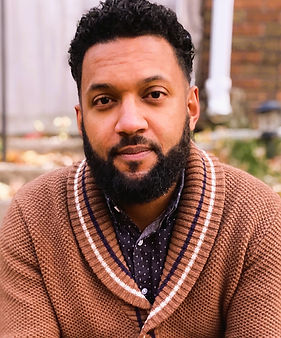
Community Empowerment Through
Black Men Healing Conference

“From Hurt to Hope: Fostering Healing for fathers”
Antoine Johnson is Program Manager of the Buffalo Responsible Fatherhood Initiative at Buffalo Prenatal-Perinatal Network.
He currently works for the Fatherhood Initiative, which is based in Los Angeles. As a fatherhood practitioner, Johnson’s work promotes father involvement to improve the lives of children and families through healthy male engagement. In addition, Johnson is a minister who regularly attends Edison Street Community Church and is passionate about “doing work that matters” and that uplifts the people he feels he’s been called to serve. Antoine helps men & fathers overcome the hurt and disappointment caused by their father's emotional or physical absence so they can heal, grow, and healthily express their emotions.
Led by the phrase, “You can’t conquer what you won’t confront,” Antoine is ready to help your group conquer the emotional pain from the past, increase self-awareness, and increase their effectiveness as a father. Invite Antoine to serve at your next conference, small group, or panel discussion.
Morning Workshops
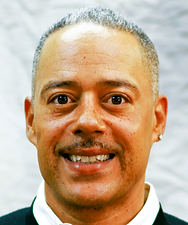
Dr. Jonathan Lofgren, a Faculty member at Minneapolis College
“Addiction and Recovery: From despair to redemption."
This workshop will delve into the complexities of addiction and substance use disorders (SUDs), focusing on their impact on African American communities, families, and particularly men. Participants will learn about Recovery and Recovery Principles specific to African Americans, as well as the various pathways and resources available for overcoming substance use disorders.
Participants will be able to identify 3 current trends in Substance Use within the African American population, describe SUD Recovery and Recovery Principles within the context of African American culture, and identify 3 pathways to SUD recovery.
"Boy to Men: Improving Relationships Between Black Fathers and Sons Through a Trauma-Informed Lens”
This interactive workshop examines the complex relationships between Black fathers and sons, highlighting how historical and intergenerational trauma, systemic oppression, and societal expectations affect their ability to connect, communicate, and heal. Participants will learn to apply trauma-informed principles to bridge relational gaps, foster emotional intelligence, and promote healthy, nurturing relationships.
Utilizing culturally grounded approaches, we will examine the unique challenges Black fathers face, including unresolved trauma, hypermasculinity, societal pressures, and limited models of positive fatherhood. Through real-life case studies, reflective exercises, and open dialogue, attendees will gain tools to support Black fathers and sons in breaking cycles of disconnection and building relationships rooted in empathy, accountability, and love.
By the end of the session, participants will be able to:
-
Identify the impact of historical, racial, and intergenerational trauma on the dynamic relationship between Black fathers and sons.
-
Explain key trauma-informed principles and how they can be applied to support healthy father-son relationships.
-
Analyze common barriers (emotional, cultural, systemic) that hinder connection and communication between Black men and their sons.
-
Apply culturally responsive strategies to foster healing, emotional expression, and trust in Black father-son relationships.
Participants will leave the workshop with:
-
A deeper understanding of how trauma shapes the relational patterns of Black men and boys.
-
Practical, trauma-informed techniques to facilitate open, healing conversations between fathers and sons.
-
Increased confidence in supporting Black male clients, students, or community members in nurturing stronger familial relationships.
-
Tools to advocate for systemic changes that promote Black fathers and sons' mental health and relational well-being.

W. Curtis Marshall, MS
“African American Infant Mortality: A Historical Perspective and The Father Factor”
A father's health and lifestyle choices significantly impact pregnancy outcomes and the health of the child. This workshop will discuss risk factors and provide a historical perspective on father involvement in prenatal and postnatal care.
“Presence & Power: Daily Practices to Heal & Lead as a Black Father”
This interactive workshop provides Black fathers with practical and effective self-care strategies to enhance their emotional regulation, reduce stress, and promote overall well-being. Participants will engage in movement exercises, guided meditation, and reflective journaling to explore daily healing rituals that encourage intergenerational healing, resilience, and connection. The session highlights how self-care for fathers not only strengthens their involvement in their children's lives but also lays the groundwork for communal healing.
Goals:
-
Equip Black fathers with practical self-care techniques that can be integrated into their daily routines.
-
Support fathers in developing emotional balance and resilience through movement and meditation.
-
Promote intergenerational healing by addressing stress and trauma through reflection and intentional practice.
-
Reinforce the importance of community-based healing and the role of fathers in strengthening family and cultural legacies.
Objectives:
-
Participants will engage in movement exercises to release tension and cultivate physical awareness.
-
Participants will experience guided meditation to develop emotional grounding and mental clarity.
-
Participants will journal and reflect on their personal fatherhood journey and healing practices.
-
Participants will discuss the role of communal healing, mentorship, and the interconnection between personal well-being and family strength.
Expected Outcomes
-
Participants will gain practical skills in movement, guided meditation, and journaling.
-
Attendees will develop a personalized self-care practice they can maintain.
-
Fathers will leave with a deeper sense of connection—to themselves, their families, and a larger community of healing.
“Diversity-informed father engagement premises and practice principles in workforce and systems development"
While more attention has been given to engaging fathers in child and family services, significant barriers exist to being inclusive of fathers in meaningful ways. This session engages participants in building awareness and understanding of those barriers, offering guiding premises and principles illustrated by current efforts in Chicago and Oakland.
Learning Objectives:
-
Utilize the Diversity-Informed Tenets for Work with Infants, Children, and Families, the family support premises, and father-friendly practice principles to frame workforce and systems development that supports engagement with and inclusion of fathers in child and family services.
-
Reflect on how gender-based beliefs and values hinder father engagement.
-
Identify practices and policies at various levels of infant and early childhood mental health work to engage with and be inclusive of fathers in child and family services.
This session will use various methods of engagement, including brief didactic presentation, activities and reflection, small group discussion, case examples from current efforts, and hand-outs in physical and digital formats.
“Black Fathers: Overcoming Trauma, Strengthening Families”
This workshop is designed to support young Black fathers in understanding and addressing the deep-rooted effects of intergenerational trauma, particularly as it relates to community resources, environmental conditions, racism, and systemic oppression. Trauma is not only an individual experience but one that can be transmitted across generations, shaping behaviors, thought processes, emotions, and relationship patterns in profound ways.
Racism itself is a form of trauma, and its impact on Black men is comparable to the battle fatigue experienced by soldiers in war-torn environments, as described by Dr. William A. Smith. The persistent stress of navigating racial trauma affects one’s ability to cope with daily life, make decisions, and engage in healthy relationships.
This workshop will integrate insights from neurobiology, neuropsychology, and traumatic stress studies to help Black fathers understand their body’s stress response and learn how to activate the relaxation system for improved health and functioning.
At the end of this workshop, participants will:
-
Understand Intergenerational Trauma
-
Define intergenerational trauma and its impact on Black family life.
-
Explore historical and systemic factors contributing to trauma transmission.
-
Recognize Personal and Familial Patterns
-
Identify how past traumas influence their parenting style and intimate relationships.
-
Reflect on personal experiences of father-child relationships and inherited patterns.
-
Examine modes of expression, connection, and communication.
-
Develop Healing and Resilience Strategies
-
Learn strategies for self-regulation to disrupt patterns and break toxic cycles.
-
Explore culturally relevant tools and practices for healing and self-empowerment.
-
Create an action plan for ongoing personal healing, growth, and development.
At the end of the session, participants will leave with:
-
A clear understanding of intergenerational trauma and its effects on Black fatherhood.
-
Insight into their own family’s trauma patterns and how they show up in their parenting.
-
Practical tools to disrupt negative cycles and build emotional resilience.
-
Strategies for fostering healthier relationships with their children and partners.
-
A sense of empowerment and connection to a supportive community of Black fathers.
“Know your rights: Minnesota’s New Paid Family and Medical Leave Program”
And because bonding leave can be taken by both parents within a year of a birth, adoption, or foster placement, even parents who welcome a child in 2025 can take leave in 2026, (as long as it’s taken before the child’s first birthday, or anniversary of their adoption or placement).
Attendees will learn more about their new rights under Paid Leave, and about the benefits of Paid Leave for themselves and their families. Our panelists will also discuss their personal experiences around bonding/parental leave, the barriers Black fathers face to accessing leave, and the significance of taking time to bond with a new child.
Goals and Objectives:
-
Inform Black fathers about their new rights under Paid Leave for parental bonding (up to three months off with partial pay and job protections starting January 1, 2026 for nearly every Minnesota worker).
-
Share tools and resources for how to use the program and where to learn more.
-
Discuss the racial disparities, cultural influences, and systemic barriers surrounding Black fathers and paid parental leave.
Expected Outcomes:
-
For the audience
-
Understand how paid leave could fit into their lives personally, and what the benefits are of taking paid parental leave for themselves and their families.
-
Feel encouraged and supported to take paid parental leave when/if they need/want it, including advocating for themselves in the workplace.
-
Feel excited and prepared to talk with their friends and family about Paid Leave.
-
For the Paid Leave program
-
Learn from the audience about the barriers Black fathers face to taking parental leave and what insights they have about how to ensure the program meets their needs.
Afternoon Workshops
“Black Fathers: Intergenerational Grief and Healing Through Family History”
This workshop examines the experiences of Black fatherhood, particularly focusing on grief after the loss of sons, intergenerational trauma, and the importance of family history. By utilizing a 100-year family history from St. Paul, we will examine the impact of historical trauma and explore how storytelling and archival resources can facilitate healing.
Goals and Objectives:
-
Explore Family History & Fatherhood
-
Discuss how historical trauma impacts fathering.
-
Explore methods to break generational trauma.
-
Goal 2: Discuss Grief & Trauma
-
Identify themes of paternal grief and loss using a family case study.
-
Discuss the impact and context of untimely deaths on Black fathers.
-
Goal 3: Share & Reflect
-
Facilitate group discussions for sharing personal stories.
-
Explore the role of community and faith in navigating grief.
Expected Outcomes:
-
Participants will increase awareness and understanding:
-
Increase awareness of the impact of paternal grief and intergenerational trauma within Black families.
-
Gain a deeper understanding of how historical trauma impacts fatherhood.
-
-
Participants will develop skills and tools:
-
Enhance understanding of archival resources as a practical grief processing strategy for healing and resilience.
-
Learn genealogical research methods to break generational trauma cycles.
-
-
Participants will engage with difficult histories:
-
Experience one approach to confronting difficult histories and breaking cycles of trauma.
-
Develop a greater appreciation for the power of storytelling and community support in navigating grief.
-
Foster a deeper respect for family history and honor ancestors.
-
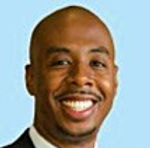
Pleasant Radford, Jr., Health Equity Officer, UCare
Panelist: Collins Eboh, Equity Business Partner, UCare, and Cedrick Frazier, Minnesota State Representative
“The Expecting Father: Black Men in Pre-, Peri- and Postnatal Care”
This session will discuss strategies to equip Black fathers with knowledge and practical tools to engage in pregnancy, childbirth, and postpartum care actively. It will address systemic and cultural barriers that restrict Black paternal involvement in maternal and infant health and provide resources for ongoing learning and engagement in Black fatherhood and family health.
"Healing the wounded child in me, while parenting the child in front of me"
This workshop will equip participants with the tools, insights, and practices needed to heal their inner wounds and support their children in nurturing emotional resilience, self-awareness, and healthy relationships. By focusing on understanding the "wounded child within," participants will learn how addressing their past traumas can help break cycles of dysfunction, ultimately preparing them to raise emotionally healthier and more compassionate future generations.
Objectives:
-
Identify the Wounded Child Within:
-
Understand the concept of the “wounded inner child” and how past experiences shape adult behavior, emotional responses, and relationships.
-
Explore how unresolved childhood trauma can impact parenting styles, discipline, and emotional availability
-
-
Healing through Self-Compassion:
-
Learn practices to connect with and nurture the wounded child within.
-
Develop self-compassionate techniques to heal past wounds and break generational cycles of trauma.
-
-
Mindful Parenting:
-
Discover how mindfulness and emotional awareness can transform parenting practices.
-
Learn how to model emotional regulation, vulnerability, and empathy for children.
-
-
Creating a Healthy Environment for Children:
-
Equip participants with tools to foster secure attachment, emotional safety, and healthy communication in their relationships with children.
-
Discuss how healing the inner child can create an environment of emotional openness and connection in the family unit.
-
-
Breaking the Cycle of Trauma:
-
Understand the importance of addressing inherited emotional patterns, beliefs, and behaviors in the family system.
-
Learn how healing your wounds and acknowledging past pain can help break negative cycles, providing children with the opportunity to grow up in a more emotionally supportive environment.
-
Target Audience:
-
Parents and caregivers looking to enhance their parenting skills and improve emotional connections with their children.
-
Therapists, counselors, and social workers who want to understand better the concept of the wounded child and how it affects parenting.
-
Individuals seeking personal growth and healing to understand how past trauma impacts their lives today.
“Breaking the Cycle: Mental Health, Self-Care, and Generational Healing for Black Fathers”
This transformative workshop will empower Black fathers to take ownership of their mental health and embrace their role as pivotal figures in their families. Grounded in my journey and the insights shared in my book, “The Greatest Love Story”, the session will delve into the critical role mental health plays in breaking cycles of generational trauma and fostering healthier family dynamics.
Black fathers face unique challenges in a society that often overlooks their contributions and dismisses their struggles. From systemic barriers to deeply rooted stereotypes, these challenges can weigh heavily on mental health, creating a cycle of stress, detachment, and emotional pain. This workshop will provide a safe and supportive environment for fathers to reflect on these challenges, explore self-care and emotional resilience strategies, and celebrate their vital role in their children’s lives.
Participants will leave this session equipped with practical tools and insights, such as how to address and process childhood trauma, communicate effectively with their children, and nurture emotional well-being in themselves and their families. This workshop is designed to inspire action, helping fathers not only to heal
themselves but also serve as pillars of strength and compassion within their communities.
By sharing my lived experience—as a young father who struggled with anxiety, depression, and the echoes of childhood trauma—I will connect with participants on a deeply personal level. Through honest storytelling, evidence-based practices, and interactive exercises, I will demonstrate how healing and self-awareness can transform not only individual lives but also the legacy we leave for our children. Together, we will celebrate the unique power and potential of Black fathers to shape the future.
By the end of this workshop, participants will:
-
Understand the Impact of Generational Trauma: Learn how unresolved trauma from childhood can influence parenting behaviors and family dynamics.
-
Recognize Signs of Mental Health Struggles: Identify symptoms of anxiety, depression, and burnout in their own lives and understand the importance of seeking support.
-
Develop Self-Care Practices: Explore culturally relevant self-care strategies that promote emotional well-being and resilience.
-
Cultivate Healthy Relationships with Children: Discover actionable ways to foster stronger, healthier connections with their children.
"Roots to Resilience: Empowering Black Fathers Through Cultural Storytelling and Trauma-Informed Care"
This workshop addresses a critical need in our community by providing culturally relevant, evidence-based approaches to supporting Black fathers. Recent studies have shown that Black fathers are more involved in their children's daily activities than often portrayed. By leveraging the power of cultural traditions and personal narratives, we aim to build on these strengths while addressing the unique challenges Black fathers face. Also, the workshop aligns with current research on the intergenerational transmission of parenting behaviors among African American fathers, emphasizing the importance of positive father-child relationships in breaking cycles of trauma. By incorporating elements of Mississippi Delta storytelling traditions, we create a unique framework for healing that resonates deeply with our cultural heritage.
Workshop Objectives
-
Explore the intersection of Mississippi Delta storytelling traditions and evidence-based mental health practices in addressing intergenerational trauma.
-
Examine current research on Black father involvement and its impact on child development and family resilience
-
Provide culturally responsive strategies for overcoming systemic barriers and fostering positive father-child relationships
-
Equip participants with practical tools to integrate cultural storytelling into trauma-informed care and family strengthening practices
Participants will:
-
Gain a nuanced understanding of the cultural and historical factors influencing Black fatherhood
-
Learn practical techniques for integrating cultural storytelling into trauma-informed care
-
Develop strategies for addressing systemic barriers and fostering resilience in Black families
-
Establish a supportive network of peers committed to empowering Black fathers
“Lessons I Never Learned From My Father: A Daughter’s Journey of Healing and Understanding Black Fatherhood”
This workshop offers a unique and heartfelt perspective on Black fatherhood through the lens of a daughter. It's a deep dive into the emotional complexities of growing up without a strong paternal presence and examines the profound impact it can have on young girls. By combining storytelling, group discussions, and culturally rooted activities, participants will explore how the absence or presence of a father shapes a girl’s identity, emotional development, and relationships. Also, she will draw from her personal experiences and themes in Lessons I Never Learned From My Father. The workshop also celebrates the resilience of Black girls and women, providing pathways for healing, growth, and understanding. Participants will leave with a deeper appreciation for the importance of Black fathers and the transformative role they play in their daughters’ lives.
Participants will:
-
Reflect on the challenges faced by Black girls navigating life without strong paternal figures.
-
Identify the emotional and cultural significance of Black fatherhood from a daughter’s perspective.
-
Explore culturally sensitive approaches to fostering healing and understanding in father-daughter relationships.
-
Celebrate the resilience and strength of Black girls and women, even without paternal support.
This workshop seeks to bring a powerful voice to the discussion of Black fatherhood, amplifying the often-overlooked perspective of daughters and celebrating the resilience of Black girls in the face of paternal challenges.
Target Audience:
This workshop is designed for anyone who has experienced the absence of a father, individuals raising daughters, and community members who want to understand the importance of Black fatherhood from a girl’s perspective. It is particularly impactful for educators, mentors, and fathers who wish to deepen their relationships with the young girls in their lives.
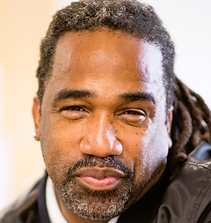
Guy Bowling, Planning Specialist, Child Support Services Division,
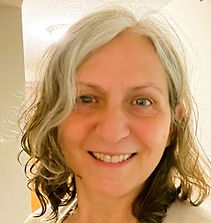
Dr. Trish Skophammer, Director, Child Support Services Division, Ramsey County Attorney’s Office
and Joe Fick, Ramsey County Attorney's Office
“Ramsey County Attorney's Office, Child Support Services”
By the end of this workshop, participants will gain an understanding of the child support system, including the rights and responsibilities of fathers in the paternity establishment and order-setting processes. Attendees will learn about the new laws that impact child support enforcement. Additionally, the workshop will explore innovative approaches that child support programs implement to engage fathers and improve services through targeted, systematic changes that focus on the whole family.
“Black Fatherhood: Invisible Wounds to Thriving Parenting”
Sam Simmons, LADC, behavioral consultant, conference co-creator, author, and co-host of the "Voices" on KMOJ FM
In this presentation, he will explore the connection between historical trauma and the perceptions, beliefs, and behaviors that have created challenges for African American fathers. It will examine how conscious and unconscious biases influence policies and community attitudes. Additionally, the presentation will discuss practical, culturally sensitive, and trauma-informed strategies that empower Black fathers to become more involved, ultimately leading to a healthier future for their children.
Day Two
Friday, June 27st
9 am to 12:30 pm
"Fatherhood as a Driver of Health for Families & Communities"
Dr. Nathan T. Chomilo, Medical Director for the State of Minnesota’s Medicaid & MinnesotaCare programs, is a General Pediatrician with Park Nicollet Health Services/HealthPartners.
Fatherhood has a profound impact, offering significant health benefits not only to children but also to fathers. The journey of being a dad can lead to a healthier lifestyle, improved mental well-being, and a deeper bond with little ones, creating a win-win situation for both generations. Embracing the joys and challenges of fatherhood can enhance the overall quality of life for the entire family and be a driver of health in communities!
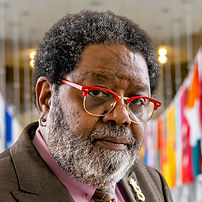
Moderator:
Sam Simmons
The Future of Black Fathers Panel
The panel will critically examine the challenges of fathers' involvement in their children's lives, from prenatal care and beyond. Additionally, it will explore practical, trauma-informed, and culturally sensitive approaches that celebrate healing and uplift Black fathers.
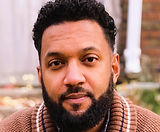
Dr. Nathan T. Chomilo,
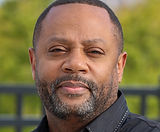
Andre Dukes

Dr. Altreisha Foster
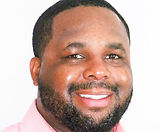
Brandon Jones, M.A.
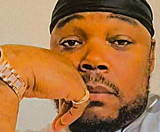
Demarcus Solo Ford
“You don’t have to be a man to fight for freedom.
All you have to do is to be an intelligent human being.” — Malcolm X

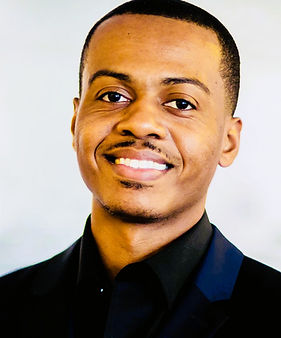





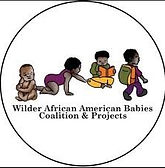


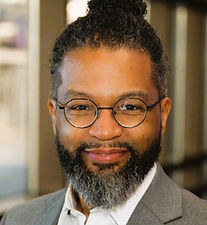





_JPG.jpg)
